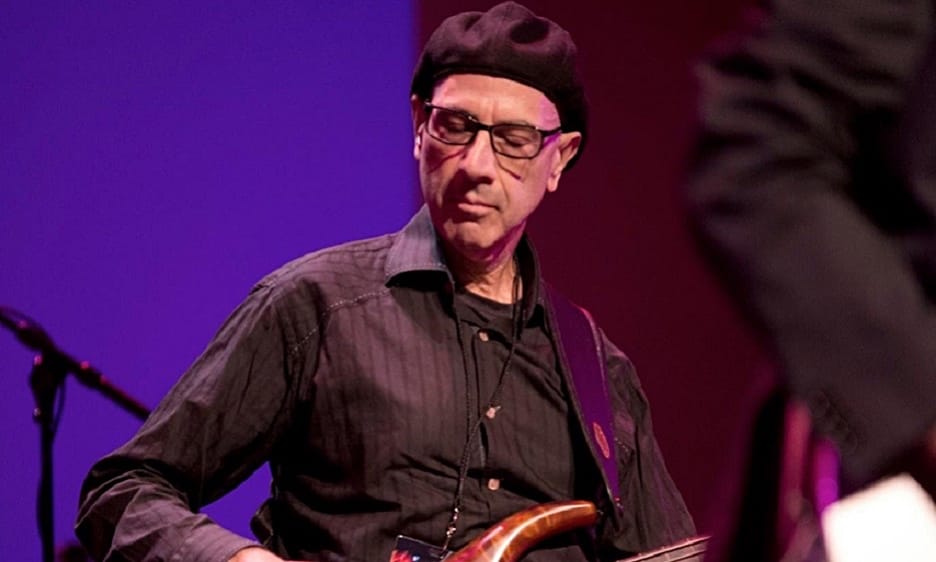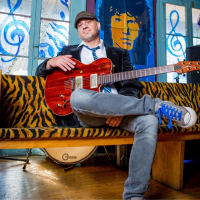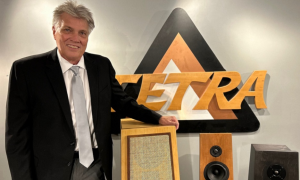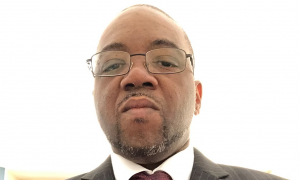Home » Jazz Articles » Chats with Cats » The Music Lawyer: Ron Bienstock
The Music Lawyer: Ron Bienstock

I’m just interested in you making a good living and I think it’s possible even if live gigs pay less than they did back in the day. The difference is the other income streams that you can take advantage of because of technology, and you shouldn’t overlook that.
—Ron Bienstock
About Ron Bienstock
As one of the most influential lawyers in the music business, Ron has a lifetime of accomplishments in the entertainment industry. Among his many landmark legal precedents, both international and domestic, was a trademark victory against Fender Musical Instruments Corporation. Representing 17 guitar manufacturers in the trademark opposition proceeding against Fender, Ron successfully argued that Fender should not be allowed trademark registrations to three key guitar and bass body shapes. It is the leading case on the issue in the U.S.Ron is an adjunct professor at NYU and is a continuing legal education instructor for Lawline.com and the New York and New .Jersey Bar Associations and has been a guest lecturer for music business programs across the country. He's represented such writers, producers, and artists as m: Billy Joel, Joe Satriani, Living Colour, Goo Goo Dolls, Dream Theater, Winger, Beth Hart, King Crimson, Carmine Appice, and Darryl Jones among many others.
As a performing and recording musician, Ron has performed extensively with various major recording artists. He co-founded The Suits and has appeared on Conan O'Brien and CNBC. Ron's Blue East ensemble performs throughout the New York metro area.
All About Jazz: Thank you for taking the time to do this. I thought you'd be a really interesting subject for this column.
Ron Bienstock I appreciate that. There is always this different angle in the jazz world because it is a different angle. It is a different conversation from normal music business conversations. There are distinctions that jazz musicians face versus the pop, rock, and even hip-hop world.
AAJ: I definitely want to get to that. Starting a little more generally, what makes entertainment law different from other areas of law?
RB Well, how long do we have? Do we have a couple days? [laughs]. Here's the breakdown. First off, I just don't even like that phrase "entertainment law." Quite frankly, It sounds somewhat absurdist as if I have a small dog and parrot show that goes on in my office. It's intellectual property and it's understanding the essentials of transactions, income streams, maintenance of those income streams, and policing those income streams. It's everything that has to do with intellectual property and what spreads out from that.
An artist can be a combination of intellectual property. If your panoply of intellectual property runs patent, trademark, and copyright, we're seldom talking about a patent with a musician unless they've invented something. We're generally talking about a band name, a trademark, and then copyright. Copyright in the music business is two-fold. It's in the sound recordings and it's in the underlying copyright in the compositions. That concept of the two copyrights in the sound recordings and compositions befuddles most people. There are some nuances in there and definite things you need to know but people get sideways when I say that because the first thing they want to talk about is "copyright" and "protection." "How do I protect myself?" But that's not the issue and not what I'm concerned about. We will find ways to take care of copyright and registration.
It's musicians, and particularly in the jazz world, where these things are essential. The conversations I've had with jazz musicians for 38 years has been, "you need to write." The conversation continues with "what do you mean?" Here's an example of what makes this all different.
A famous jazz guitarist client of mine becomes a new client and I say, "Can you show me your agreement with [major jazz label]?" He gets grumpy and says, "Why?" I say, "Because your email says you don't make any money from records and I'd like to see the agreement. I'd like to see what occurred here since I didn't represent you in that deal. I know that label well and they're very good at accounting."
I get the agreement and size it up in fifteen seconds. I call him up and say, "Who negotiated this?" He says "I did." There's silence from my end of the phone of course and then I say, "Why would you do that?" Then he goes into a tirade about costs and lawyers. I say, "Well, not everyone is expensive but you've negotiated an agreement that does not have escalations on so many aspects of, first, your royalties. That's what you get paid for playing on a record. You have no escalations, no increases. It's the same royalty rate for every record. He said, "What's the difference?" I said, "The difference is that you'll make more money. The second part is, I see why you don't make any money. The last five records you've done for this label has been all covers. Every record is covers." He says, "So, what do you mean?" I said, "If you record someone else's composition, there is no income to you from publishing. "
Publishing is the key to the music business. You're not going to get any money for covering "Gentle Rain" which, by the way, has been covered a thousand times." He says, "What do you mean I don't make any money from that?" I explained to him, "You're not the publisher. The 9.1 cents for each of your covers, the statutory rate right now, is going out to a third party publisher. The last record you did had ten covers, that's ninety one cents you're not making on every record. If you wrote ten songs, even under a controlled composition clause where'd you'd make 75 percent of that 9.1 cents, you'd get at least 70 cents a record." This was a revelatory moment for that artist. There's entertainment law all in one discussion that took all of ten minutes. It's all there
AAJ: That's shocking to me that an artist at that level wouldn't know that.
RB Yes. Welcome to the music business. He did not understand that. Nobody had explained it to him. The jazz theory... Can we get into it, do you mind?
AAJ: No, not at all
RB I've had conversations with jazz musicians for many decades that go like this, "I don't make any money from my records. They're just for my gigs man." I always shake my head and say, "This is not 1955. You're not getting into a Cadillac with the acoustic bass strapped to the top, driving from New York to Philadelphia to do the gig and driving back." That's not what this is anymore. It's a global business for people in all countries around the world for you to create an audience with. Your records mean something but you need to maximize that record. If you do all covers, as we just discussed, you'll lose money from publishing. But, if the perspective you've got is that all records are meaningless and you don't support them, you're missing the boat.
That record is not a loss leader, it's an income stream that you need to take advantage of. If you're with a label that doesn't promote, or they're tiny and have no budget to do this, then we need to talk about that. Is there a social media methodology? Is there something else that's not too costly? The jazz world has been filled with these conversations. "Hey man, I don't make money from my records so I don't really care about them."
AAJ: Yes, that sounds very familiar
RB Yeah. Then I get into the conversations with people, and I look at these with two different hats, the bassist hat as well as my lawyer hat. How many conversations have I had, particularly in the jazz world that say, "Hey man, what's the bread on the date?" I say, "Look, you need to think in a much broader sense. There's live income, there's income from merchandise, meaning clothing as well as selling your record at the gig, music publishing, and income from sound recordings." When I go through that analysis with people, again, revelatory moments where they go, "Whoa, I didn't know that."
This is a quintessential issue with all people in the music business but there's a subset within the jazz world that are uninformed.
AAJ: Why do you think that is?
RB That's an excellent question. I think it's become a time-honored tradition where you just want to play and not worry about the business and somehow it'll take care of itself. We all know the Miles Davis history in his biography. He was very concerned with his business. I think there's been a decades old lack of focus and more of, "When am I playing live and who am I playing with?" rather than the panoply of all these things I just went through: the live; the merch; the publishing; and the sound recordings. You need to have passive income. You can't be touring three hundred sixty-five days a year. It can't be done
AAJ: Musicians have a long history of being taken advantage of. Are they more informed these days?
RB I've made every effort to be the source for information that anyone would ever need at all times but sometimes there is a lot of screaming into the wind on that. There is a lot of misinformation. The web is filled with nonsense. I mean, in the most candid way, crazy nonsense. Here's one of the things that still goes on. I'm sure you're going to laugh and say, "C'mon, people still ask that?" It's true.
I'll get a recording from someone and I'll say, "There's a sample on there." They'll say, "I'm allowed to take five bars for free. What do you mean?" I'll say, "Where did that come from?" They'll tell me, "I saw it on the web." That's classic. "I'm allowed to take four beats," or "I'm allowed to take five bars." Or, "I'm allowed to take a small phrase."
There's still the belief that if you send some recording to yourself in the mail, it's called "poor man's copyright,' People still believe it. It's utter nonsense.
It's a question of accurate information. It's a question of having experienced an actual presentation of how the music business works which is an important part of the learning growth curve. Then there is the whole group of people who have "been burned," get very cynical, and just don't want to know.
But it doesn't have to be that way and it doesn't have to be that way in the jazz world. While it is a segment of the music business, there is a worldwide fan base that can be yours.
AAJ: What is your advice with regard to signing record deals these days. Is it worth it for a musician, specifically in the jazz world?
RB That question has probably been going on for the last 15 years. Here's a classic. So, a small jazz label sends an agreement to a well-known jazz musician and in the agreement it says that the jazz musician, who has paid for the recordings of this latest record, assigns the rights to the masters to the label forever. Right. Why would you do that? Why would someone do that? Why would you pay for it, give it to them, they don't give you any money for it, but they say they'll promote it and market it but it's theirs for now on. It's their product and in their catalog forever. Why would we do that?
There are alternatives to that, there is a license deal, there is just not doing that deal at all of course. Beyond owning the masters, and I have seen many of those in the last 15 years, is there a controlled composition clause? Are you getting paid 100 percent of your mechanical royalties? What's the budget to promote the record? Did they commit a budget in this agreement? Some of the jazz deals I have seen are just truly awful because there is a lack of understanding sometimes.
AAJ: Do you think this is more prevalent in the jazz world?
RB It's a symptom of the whole industry but there are a lot of terrible jazz deals. There are people who are—I don't want to say "desperate" because that sounds too histrionic—approaching that point where they say, "Who is going to want me? I'm 50. I'm 60. Who's going to want me?" There are no expiration dates on greatness and talent. I don't understand that whole idea. You're not a defrosted turkey in the supermarket with a sell-by date.
Jazz musicians can play longer than anybody. Their careers can often go past 70 years, or even 80 years. It's a knowledge of the business, knowledge of the transaction, knowledge of the deal. We can do a license deal where the copyright reverts back to you after x number of years. Labels might say, "that's not worth it to me." I'll say, "of course it is. What's the shelf life of that record? Seven years before it starts to take a downturn?" Jazz records have a longer shelf life that is clearly longer than pop, hip-hop, and some rock records. They could last forever. I bet the sales of Kind of Blue have been consistent for 60 years.
Just seek out the right advice. Not everybody is out to take you. Not all labels are bad. Not all of the managers or lawyers are bad. Just find someone you have confidence in because that's the issue. It's a trust factor. Do you trust them to be on your side? It's the same with a label. Do you trust the label to expend the budget wisely? Report earnings wisely? To handle the deal as if they were in your shoes? There's a little due diligence that needs to be done here by the way.
AAJ: From my own experience, it's not difficult to understand. It just takes a little leg work and you have to talk to people.
RB Yeah. But, I think the one part that does get a little opaque is music publishing. I have to go through that several times a day, every day, and have for many years. I even gave a TedTalk on this. I had 28 minutes to get it all in and I couldn't have spoken any faster trying to get the information out. It's a very dense area and there's a lot of misunderstanding. Once you're in and get it though, you are in good shape.
AAJ: You led a case against Fender that has been labeled as a David vs. Goliath. Could you tell me about it and the ramifications from the judgment
RB It is slightly misunderstood. It was a trademark opposition matter. It wasn't a lawsuit for money. I was not representing 17 companies suing Fender for money. That has all been misunderstood. It was a trademark opposition case, more important to people's lives and careers, but not about money. It would mean money later on.
Fender had decided in 2003 to apply to own the Strat, the Tele, the P Bass, and by way of another conversation the Jazz Bass which followed. They wanted to own these body shapes. In trademark parlance these are called "product configurations." I took a look at this and said, as the kids would say, "O.M.G." I represent a whole lot of music instrument companies that make Strat, Tele, P Bass, and J Bass style instruments and have for decades. So, if Fender owned a trademark, my view is that they could do one of a number of things. They could say, "Stop what you're making and what you've been making. The only way I'll allow you to do that is to license it from me." The entire guitar industry would come to a screeching halt around the world because that means that one company would have a monopoly on the shapes of instruments that have been out since the early fifties. Hundreds of companies have made these.
When someone says, "I have a Strat," the next question is, "Who makes it? Is it an ESP? Is it a Sadowsky?" Strat didn't mean a Fender. It meant a solid body guitar, offset body, etc. That case took six years and it was, I'll suggest, heavily contested. It went all the way to trial. There is such a thing as oral argument in trademark trial appeal board. It went all the way. We got a 72-page decision which is the precedential decision that is the law of the land. That means that those shapes are generic and everyone can make them. All you need to do is look around the world and you'll see that anyone can make any of those Fender shapes that have been in the marketplace for decades because those shapes are now generic and that case gets used to establish genericism.
AAJ: These companies owe you a big thank you I'm sure.
RB It's a funny thing that you should say that. When I would walk around the NAMM show with a friend or a colleague, we would walk by hundreds of booths of people making stuff like this and they would always say, "Say thank you to this guy" because they had no idea. I mean I go to every NAMM show and there are some people that know but there are a lot of people that have no idea that we allowed them to be in a position to make those things.
AAJ: A little about yourself, you are a bassist as well as a lawyer. Did you ever want to be a full-time musician or did you know it would always be a side gig?
RB That's a great question. I started playing for a living in high school. I played through college and with some recording acts after college. Then I went to law school and continued to play. Of course I said I wouldn't, but I did [laughs]. I played all through school, played after law school with another bunch of recording acts. I've continued doing it for 50 years now. So, I never stopped doing it but, from my perspective, I didn't want to be playing on the road 330 dates a year. That's a decision I made. It doesn't mean that everyone should make the same decision. I looked at the lifestyles of older musicians I was on bills with and thought, "I don't think that's the life I'm looking for."
I decided to be an entertainment attorney when I was 17 because I felt like that's what I wanted to do, and as I went through recording agreements as a musician—and God this is true [laughs]—I would be dealing with entertainment lawyers that I thought hate musicians and don't know anything about what I do for a living. I felt like I could do these two things and occasionally they would intersect, some would say clash.
A good example is a band I had, The Suits, from about 1988 until about 2010. It went through a couple incarnations with some amazing musicians but everyone started to move away and pursue different aspects of their career and it just ran its course. But, we put out two records, we played on Conan O'Brien, we were the house band for a show on CNBC, and we toured. I was practicing the whole time. I was putting together agreements at hotels through their fax machines and would send to opposing counsel with cover sheets I carried with me. I got to know people at business centers at hotels and would send things out while on the road because this was before we had computer versions of things. I was doing that all through the '90s and well into the 2000's. It was great. I have no complaints, but, then there was the reality of having a family and a house and we were doing 80 dates a year. I had to bring that down.
But, I'm still playing all the time. We're musicians. People who say, "I used to play," I don't understand that. What do you mean you used to play? You're a musician. That's what you do. I can't separate that from who I am.
AAJ: What's your favorite music to listen to?
RB YouTube has been a godsend for me. I go back and watch live performances of artists that I didn't see enough of, or that I didn't see during certain touring days, or didn't see them supporting certain albums. I go through phases. I went through a Robin Trower phase. Every show I could find from 1973 on, I watched on YouTube. I went through a Wayne Shorter phase. I went through a Weather Report phase. I went through a Miles phase. There's a never ending Jaco Pastorius phase. I went through a John Entwistle phase as a The Who fan, and a Stanley Clarke phase.
Then I went through an early jazz mania where I was finding everything from Slam Stewart to anybody I could find with live performances filmed during the '30s, '40s, '50s, and '60s. I'd watch any bassist I could find. I found Ron Carter lessons online. I just go through phases with something that strikes me.
Here's a good example, and don't even ask me how I came up with this, but I saw Paul Rodgers playing with Queen and I'm sure people would say that they don't fit together but it was a great combination. He did a fabulous job. Paul Rodgers looks great, sounds great, looks really healthy, and he's kept his voice. It made me go back and watch early Free and Bad Company shows. I thought, that guy is a role model. He is a role model for people. He's kept himself together for 60 years of performing and I thought it was just great.
Other things I listen to are clients that have intersections with other people or bands that become new clients. I'll go back and watch early performances so I can really understand them and know their background during periods of time where they might have played with other people. That's part of the practice. But, I go through periods where something strikes me and I'll just start to watch it.
AAJ: Do you have an opinion of where the business is going?
RB Sure. I'll go through a couple levels of it. I represent a lot of instrument companies and I'm a gear geek. I do have a superpower. My superpower is putting non-musicians to sleep, out cold at dinner tables, when someone mentions that they just bought a guitar or piece of gear because immediately I'm on a gear conversation and everyone wants to go home.
Starting with musical instruments, the new technology and the quality of gear you acquire that makes life better for you are astounding. If you're still carrying around an 85-pound guitar amp you might want to rethink that you have to carry that thing around anymore. The transportation to and playing gigs doesn't have to be the exhaustive process that it was. Technology has enabled musicians to record at home and to play live in simpler circumstances in terms of gear and cartage. There are better sounding P.A.'s. Drummers have better hardware. Your life is different and you don't have to carry around the same stuff you had to in the past. It is a betterment and makes life easier for you and particularly on the recording side.
Your investment in a home studio besides a MacBook Pro, some plug-ins, and a little bit of outboard gear, is nowhere near what your investment was 25 years ago. You can record your shows in a simpler fashion, the quality of microphones has improved so your ability to record a live show is almost as easy as you could possibly make it. Making video is easier. I only wish, in the old days, I had some video of what people record on their cell phones now
That has improved your live performance, your recording of your shows, video, live recording, and studio recording. You can record with people around the world, across the web, and get a great record out. This is an unbelievable transition for musicians and they should embrace it wholeheartedly. It makes your life so much easier to put out product, to communicate with an audience, to communicate with a fan base, and to make new income streams for yourself. The jazz world has devotees. The closest analogy I can make is a strong parallel between the jazz world and the progressive rock world. People are going to say, 'What?" I think there is. I think the audience of progressive rock is as absolutely devoted to their favorites as jazz fans are.
AAJ: I grew up the biggest Rush fan.
RB Exactly. Perfect example. Besides jazz artists I represent lots of progressive rock bands like Dream Theater and many others. There is a true parallel between these fan bases and it just shows how you can carry forward to a bigger audience using this technology to your advantage. Learn it. Study it. Use it for your best interest. It's a good thing.
AAJ: Are you talking about crossing over to different audiences?
RB Sure. People will discover you if you maintain your presence. You can do that by putting out music. People no longer have to put out an LP. We're not particularly an LP-oriented listening audience. You don't have to do that. If you have a record that you feel is a statement on its own and it's inherent that you put out the ten tracks together, that's fine. You don't have to.
Where's it all going? This is where it's going: the instantaneous delivery to an audience of the show you did five days ago. Thirty years ago, that would have to have been released by a record company, gone through edits, maybe not recorded the way you liked, maybe not the best of performances, That's all at your fingertips now. Everything is available to you. That's the first part.
The second part is that all you've got to do is understand the business of becoming a musician and the income streams that spin off from it. Put that all together. All I care about, as your lawyer, is that you make a good living and that you get to support yourself as a musician. If you're interested in fame, that's a different world. I'm just interested in you making a good living and I think it's possible even if live gigs pay less than they did back in the day. The difference is the other income streams that you can take advantage of because of technology and you shouldn't overlook that.
To sum this up, streaming is not going to aid the average jazz musician earn a living. It's just not. The numbers aren't there. Downloading is a different story. People will download if they're a rabid fan and want to own your material. That's great. Streaming is great for labels on a gross tonnage basis but it doesn't aid the livelihood of the jazz musician so you need to have other income streams. That's why I'm mentioning all of this technology. Use it. If you don't know how, learn, or associate yourself with people who can help you. Nobody should be a luddite in 2022 and say, "No, I'm not going to do that. I don't want to know."
AAJ: Anything else you'd like to mention?
RB The only thing I'd add is this. As a professional in the music business, there are difficulties, sure. But, you can overcome all these things. You just have to decide that the business of being a musician has a music business aspect to it. You just have to embrace that. The last part is that what I do is not a job. I love what I do. I have clients that I have been representing for a long time. Now I'm representing their kids' bands. Those are the really fine moments.
Tags
PREVIOUS / NEXT
Support All About Jazz
 All About Jazz has been a pillar of jazz since 1995, championing it as an art form and, more importantly, supporting the musicians who make it. Our enduring commitment has made "AAJ" one of the most culturally important websites of its kind, read by hundreds of thousands of fans, musicians and industry figures every month.
All About Jazz has been a pillar of jazz since 1995, championing it as an art form and, more importantly, supporting the musicians who make it. Our enduring commitment has made "AAJ" one of the most culturally important websites of its kind, read by hundreds of thousands of fans, musicians and industry figures every month.

























